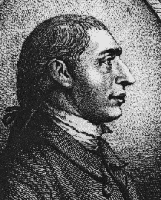The ablest man among the New York delegates in the Continental Congress was Gouverneur Morris. He was born at Morrisania, near the city of New York, on the 31st of January 1752. Being of a wealthy family, he enjoyed the advantages of a complete classical education. He graduated at King's College, in May 1768. Immediately after he entered the office of William Smith (the historian of the colony) as a student of law. In 1771, he was licensed to practice law. His proficiency in all his studies was remarkable. He acquired an early reputation as a man of brilliant talents and various promise. His person, address, manners, elocution, was of a superior order. In May 1775, Mr. Morris was chosen a delegate to the Provincial Congress of New York. In June of that year, he served on a committee with General Montgomery, to confer with General Washington respecting the manner of his introduction to the Congress. He entered with zeal and efficiency into all the questions and proceedings which referred to a vigorous resistance to the pretensions of the mother country.
In December, 1776, Mr. Morris acted as one of the committee for drafting a constitution for the State of New York, which was reported in March, and adopted in April, of that year, after repeated and very able debates, in which Jay, Morris, and Robert R. Livingston were the principal speakers. 'in July, 1777, he served as a member of a committee from the New York Congress, to repair to the headquarters of Schuyler's army, to inquire into the causes of the evacuation of Ticonderoga. In October of that year he joined the Continental Congress at York, Pennsylvania, and, in 1778, wrote the patriotic and successful pamphlet called Observations on the American Revolution, which he published at the beginning of 1779. We must refer to the journals of Congress for an account of his many and valuable services, rendered in that body to the Revolutionary cause. In July 1781, he accepted the post of assistant superintendent of finance, as the colleague of Robert Morris. He filled every office to which he was called with characteristic zeal and ability.
After the war of the Revolution, this active man embarked with Robert Morris in mercantile enterprises. In 1785, he published an Address to the Assembly of Pennsylvania on the Abolition of the Bank of North America, in which he cogently argued against that project. In December 1786, he purchased from his brother the fine estate of Morrisania, and made it his dwelling-place. Here he devoted himself to liberal studies. In the following year, he served with distinction as a member of the convention for framing the constitution of the United States. December 15, 1788, he sailed for France, where he was occupied in selling lands and pursuing money speculations until March 1790. He than proceeded to London as private agent of the American government with regard to the conditions of the old treaty, and the inclination of the British cabinet to form a commercial treaty. In November 1790, he returned to Paris, having made a tour in Germany. In the interval between this period and the beginning of the year 1792, he passed several times on public business between the British and French capitals. February 6, 1792, he received his appointment as minister plenipotentiary to France, and was presented to the king, June 3d. He held this station with great éclat until October, 1794. He witnessed the most interesting scenes of the Revolution in the capital, and maintained personal intercourse with the conspicuous politicians of the several parties. The abundant memorials which he has left of his sojourn in France, and his travels on the European continent, possess the highest interest and much historical value, he made extensive journeys after he ceased to be minister plenipotentiary, of which he kept a a full diary.
In the autumn of 1798, Mr. Morris returned to the United States, to engage in politics, with enhanced celebrity and a large additional stock of political and literary knowledge. He was universally admitted to be one of the most accomplished and prominent gentlemen of his country. In 1800, he entered the Senate of the United States, where his eloquence and information made him conspicuous. The two eulogies, which he pronounced--one on General Washington and the other at the funeral of General Hamilton--are specimens of his rhetorical style. His delivery was excellent. Mr. Morris, at an early period, gave special and sagacious attention to the project of that Grand Canal by which the State of New York has been so much honored and benefited. In the summer of 1810 he examined the canal route to Lake Erie. The share, which he had in originating and promoting that noble work, is stated in the regular history which has been published of its conception and progress. In May, 1812, he pronounced a public and impressive eulogium on the venerable George Clinton; in the same year, an oration before the New York Historical Society; in 1814, another on the restoration of the Bourbons in France; in 1816, a discourse before the New York Historical Society. Mr. Morris died at Morrisania, November 5, 1816. He passed the latter years of his life at Morrisania, exercising an elegant and munificent hospitality, reviewing the studies of his early days, and carrying on a very interesting commerce of letters with statesmen and literati in Europe and America. The activity of his mind, the richness of his fancy, and the copiousness of his eloquent conversation, were the admiration of all his acquaintance. Source: Marshall, James V.. The
United States Manual of Biography and History. Philadelphia: James B. Smith & Co., 1856. Pages 137-139.



